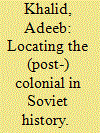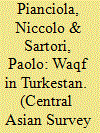| Srl | Item |
| 1 |
ID:
082361


|
|
|
|
|
| Publication |
2007.
|
| Summary/Abstract |
Why were cotton monoculture and megalomaniac irrigation projects the outcome of the Soviet modernization policies in Uzbekistan? How were economic development and nationality policy related? Which results did policy implementation produce on the ground and within the Uzbek ruling elite? The article argues that these questions can be seen in a new light when interpreting the early Soviet policies in Central Asia as de-colonization. In the Bolshevik view, national 'liberation' and economic 'modernization' were at the heart of a process to mitigate the consequences of 'imperialism' and 'colonialism' in the region. On the basis of archival evidence, the article demonstrates how de-colonization worked in Uzbekistan's irrigation sector which brought together conflicting visions of nationality policy and economic development. Limits quickly became visible as central interference, collectivization, and continuous state violence obstructed the original agenda of de-colonization
|
|
|
|
|
|
|
|
|
|
|
|
|
|
|
|
| 2 |
ID:
082359


|
|
|
| 3 |
ID:
082362


|
|
|
|
|
| Publication |
2007.
|
| Summary/Abstract |
This paper investigates how post-colonial studies may help us grasp the transformation of musical life in Central Asia. Drawing on the emphasis of post-colonial scholars on the variety of nationalisms, I examine the developments of musical life in Uzbekistan in the early Soviet period, and describe two kinds of musical nationalism-each symbolized by a musical object. While the kind of musical nationalism that gained strength in the early 1920s was directed to building 'Uzbek classical music' that of the 1930s was focused on creating an 'Uzbek opera'. Judging from some recently published accounts, I observe that while Uzbek musical nationalism of the 1920s had notable resemblances with Indian musical nationalism under British colonialism, that of the 1930s significantly differed from the two.
|
|
|
|
|
|
|
|
|
|
|
|
|
|
|
|
| 4 |
ID:
082360


|
|
|
|
|
| Publication |
2007.
|
| Summary/Abstract |
The paper investigates early Soviet policies regarding the institution of waqf (charitable endowment) in Turkestan, questioning the issue of the post-colonial character of the early Soviet administration. After taking into consideration practices related to waqf management in modern Muslim states and European colonial empires, the paper briefly describes the tsarist administrative approach to the issue. We then address the ambiguity inherent in Soviet policies on waqf requisition and restitution during Civil War years. In the section that follows we deal with different groups of Muslim intellectuals that attempted to use the Soviet state in their mutual struggle over authority in Central Asian society and describe the creation and functioning of the bureaucracies responsible for managing waqf. Finally, we outline some provisional conclusions on the legacy of tsarist colonialism for Soviet power in Central Asia and the role played by progressive Muslim intellectuals
|
|
|
|
|
|
|
|
|
|
|
|
|
|
|
|